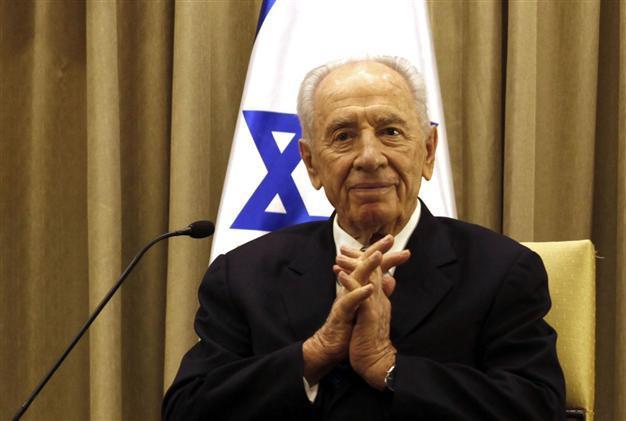Israel not involved in Syria but will respond to attacks: Peres
JERUSALEM - Agence France-Presse

AFP Photo
Israeli President Shimon Peres said Thursday that Israel was not involved in the conflict in neighbouring Syria, but will respond with all its might if attacked.This came amid expectations of a Western strike against the regime in Damascus in response to an alleged chemical attack last week. "Israel was not, and is not, involved in the Syrian fighting but if anyone tries to harm us we will respond with all our might," Peres was quoted as saying in a statement from his office. "Israel has a strong army, modern and powerful, and a more advanced defence system than ever before," Peres said.
The veteran Israeli president also said the situation in Syria, where a civil war that erupted in March 2011 has killed more than 100,000 people, "is not a local incident but a crime against humanity." Israeli media and officials sought to calm the public on Thursday, as queues for gas masks lengthened. There are fears that it the United States and its allies launch military strikes on Syria, Damascus could retaliate against Israel, Washington's key ally in the region.
"Keep calm and carry on" was the title of a front-page analysis in the Jerusalem Post, echoing a slogan designed by the British government in World War II.
"With (Israeli) military intelligence keeping more eyes and ears open to enemy activity than ever before, the combination of Israel's firepower and accurate intelligence would spell very bad news for the Assad regime should it choose to target Israel in response to an attack on Syria by the United States," the Post wrote.
"Defence officials are quite confident he will not commence hostilities against Israel," it added. "Doing so would likely sign his regime's death certificate." On Wednesday, Prime Minister Benjamin Netanyahu's security cabinet authorised a limited call-up of reservists, but the premier said in a statement that members of the public had "no reason to change their routines." Haaretz daily said those to be called up numbered "a few hundred" personnel considered vital, including members of missile defence, air force, intelligence and civil defence units.
"We need to make preparations but also to go about our daily lives," Defence Minister Moshe Yaalon said on Wednesday.
News website Ynet reported on Thursday that "hundreds" of people were waiting outside a gas mask distribution centre in central Tel Aviv before it opened, and public radio said "thousands" were queueing at a distribution site in the northern city of Haifa.
Maariv said a centre in Jerusalem was forced to close on Wednesday after anxious residents grabbed all the mask kits on the premises, in a scene the paper described as a "battleground." Nevertheless, Maariv reported, "security officials said that the situation assessment was that the likelihood of an attack on Israel was low." The kits were first distributed to the Israeli public during the 1991 Gulf War over Kuwait when Saddam Hussein's Iraq fired 39 Scud missiles at Israel as the US-led coalition launched Operation Desert Storm.
In addition to gas masks they contain syringes of the anti-nerve gas agent atropine for self-injection.
Yediot Aharonot diplomatic writer Shimon Shiffer recalled the 1991 attacks, which did not deliver non-conventional warheads and caused few casualties.
"Yesterday, against the backdrop of pictures of panicked civilians crowding the distribution centres for gas mask kits, I remembered something I said back then: 'There are no chemical weapons and there will be no chemical weapon attack,'" Shiffer wrote in the top-selling daily.
"It seems to me that what was correct then, is correct today too. I dare to say that no chemical weapon attack is expected on Israeli targets. We can relax."
















